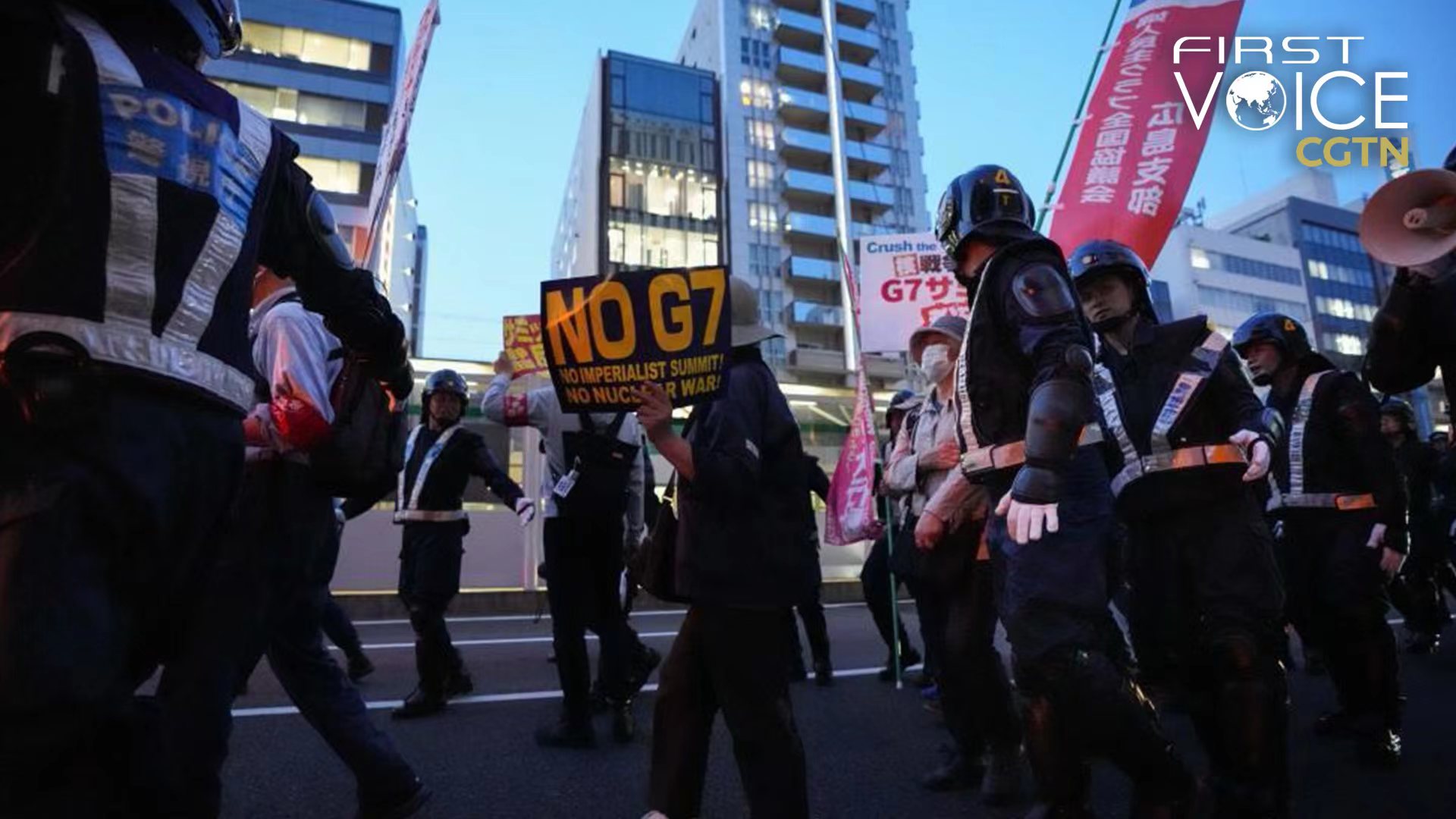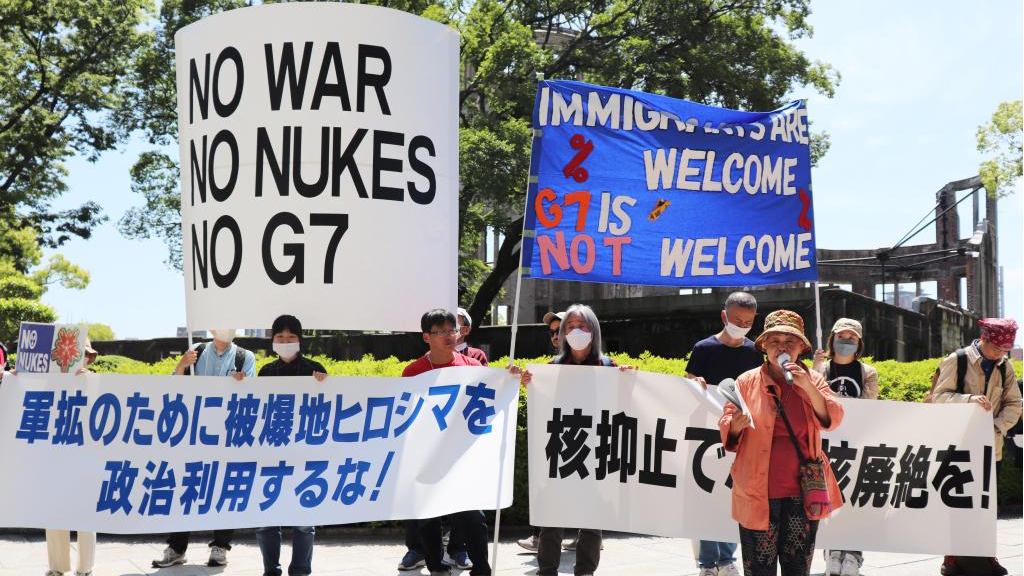
Editor's note: CGTN's First Voice provides instant commentary on breaking stories. The column clarifies emerging issues and better defines the news agenda, offering a Chinese perspective on the latest global events. This First Voice article is written by CGTN Special Commentator Bobby Naderi, a London-based journalist, guest contributor in print, radio and television, and documentary filmmaker. The article reflects the author's opinions, and not necessarily the views of CGTN.
The recent G7 summit in Hiroshima, Japan, which prioritized tightening sanctions against Russia and paring back exposure to China, serves as a reminder of how irrelevant these events have become. In today's linked and diverse world, the G7's communique falls short of bringing about substantial change, despite their desperate attempts to project strength and solve complex challenges and interconnected problems.
No less significantly, the G7's exclusivity has hindered its capacity to make substantive progress on any issue. Choices taken by only a small number of people do not adequately represent the diversity and complexity of the global populace. The communique highlighted how less and less important these meetings have become in the face of increased cries for inclusion and multilateralism.
Misguided priorities
The G7's efforts to interfere in other countries' domestic issues, especially those of China, diminish their importance and influence on the international scene. The G7 leaders' statement targeted Beijing on a number of fronts, including the South China Sea, so-called human rights questions, and suspected meddling in democracies. China's Foreign Ministry, however, rightfully voiced "strong dissatisfaction" with the G7's strategy and criticized their claims as having no international clout.
The G7's emphasis on China and efforts to unite against the purported activities of the nation illustrate the group's erroneous priorities. The G7's insistence on meddling in the domestic affairs of other countries is counterproductive and hinders their capacity to make substantial change in the interconnected world of today, where cooperation and diplomacy are essential. The G7's strategy alienates potential partners and feeds a cycle of hostility and distrust, instead of cooperating with China and other countries to address shared concerns.
Concerns about the G7's position on the Taiwan question are also legitimately raised by the Chinese Mainland. The G7's focus on regional harmony and silence on the need to reject "Taiwan independence" give the impression that they are complicit with and supporting separatist activities. The stability and tranquility across the Taiwan Straits could be threatened by this strategy. The one-China principle, which has long been the cornerstone for sustaining peace in the area, should be followed when resolving the dispute about the Taiwan question, as said in the statement.

People holding banners protest against the Group of Seven (G7) summit at the site of the atomic bombing near the Peace Memorial Park in Hiroshima, Japan, May 14, 2023. /Xinhua
People holding banners protest against the Group of Seven (G7) summit at the site of the atomic bombing near the Peace Memorial Park in Hiroshima, Japan, May 14, 2023. /Xinhua
It makes sense that China would prioritize maintaining peace in the East China Sea and South China Sea. Respect for regional efforts to maintain peace and stability is essential from the perspective of the concerned countries. A path to cooperation can be blocked by the G7's participation in maritime issues and efforts to stoke tensions between the nations in the region. Provocative acts that worsen the situation should be put on the back burner in favor of diplomatic engagement and dialogue.
China has a point when it says that the G7's unilateral penalties, decoupling actions, and disruptions of supply chains amount to economic coercion. Such actions, which politicize and weaponize the trade and economic interactions, should not be taken by the G7. Global prosperity would be more likely with a cooperative approach that encourages fair trade and mutually beneficial economic ties.
An outdated mindset
The global community is adopting multilateralism and inclusive approaches to global governance, in contrast to the G7's exclusive strategy toward future dealings with China. The communique from the G7 summit, which emphasizes the need to lessen reliance on trade with China, displays an antiquated mentality that does not fully embrace the huge advantages of engagement and cooperation with the world's second-largest economy.
The growing significance of groups like the United Nations and regional blocs like the Shanghai Cooperation Organization, which offer forums for communication and cooperation among a wider range of nations, is an example of the shift towards multilateralism. These forums value developing understanding, including multiple viewpoints in decision-making processes, and working together to overcome challenges.
The G7's focus on cutting back on trade with China further ignores the interdependence of economies in the modern, globalized world. Fraught attempts to divorce from China might have unforeseen effects for both G7 members and non-members, including disruption of supply networks and stifling economic progress. All countries would benefit more from adopting an inclusive strategy that aims to steer global governance through discussion and collaboration.
The G7's emphasis on trade restrictions against China obscures the urgent global crises that call for a coordinated response. Diplomatic collaboration, inclusive discourse, and cutting-edge solutions with China and other economic powerhouses are required on issues including climate change, sustainable development, and cybersecurity that go beyond the G7's limited purview. A limited number of rich states cannot successfully handle these issues alone because they affect the entire global population.
In an era of unparalleled cooperation, it is crucial for the G7 leaders to promote inclusive and cooperative platforms that let a wider range of nations participate in global governance. It is crucial to recognize that the arbitrary exercise of power may not be sufficient to prevent conflicts, much less advance a more predictable and stable international order.
(If you want to contribute and have specific expertise, please contact us at opinions@cgtn.com. Follow @thouse_opinions on Twitter to discover the latest commentaries in the CGTN Opinion Section.)